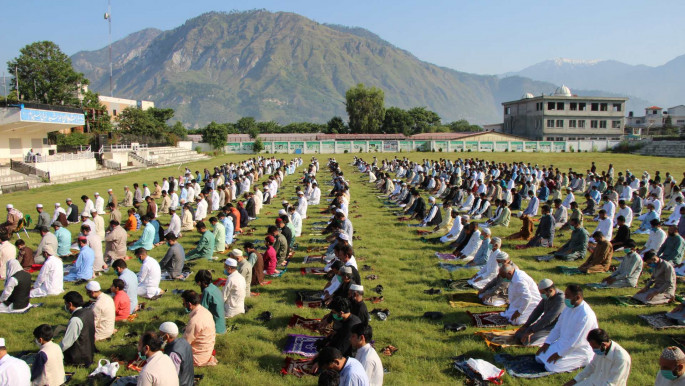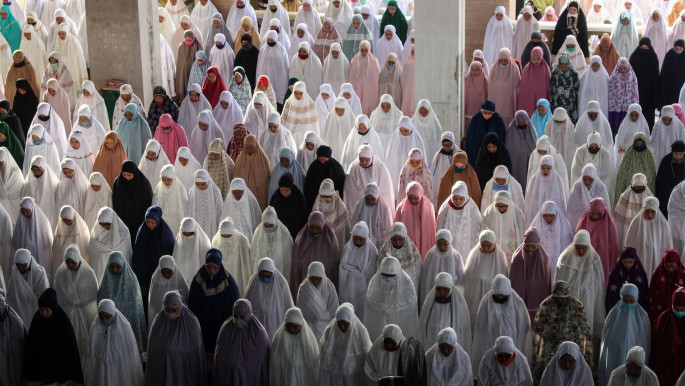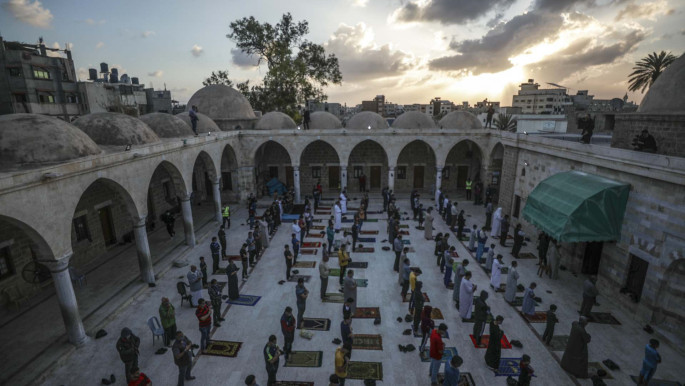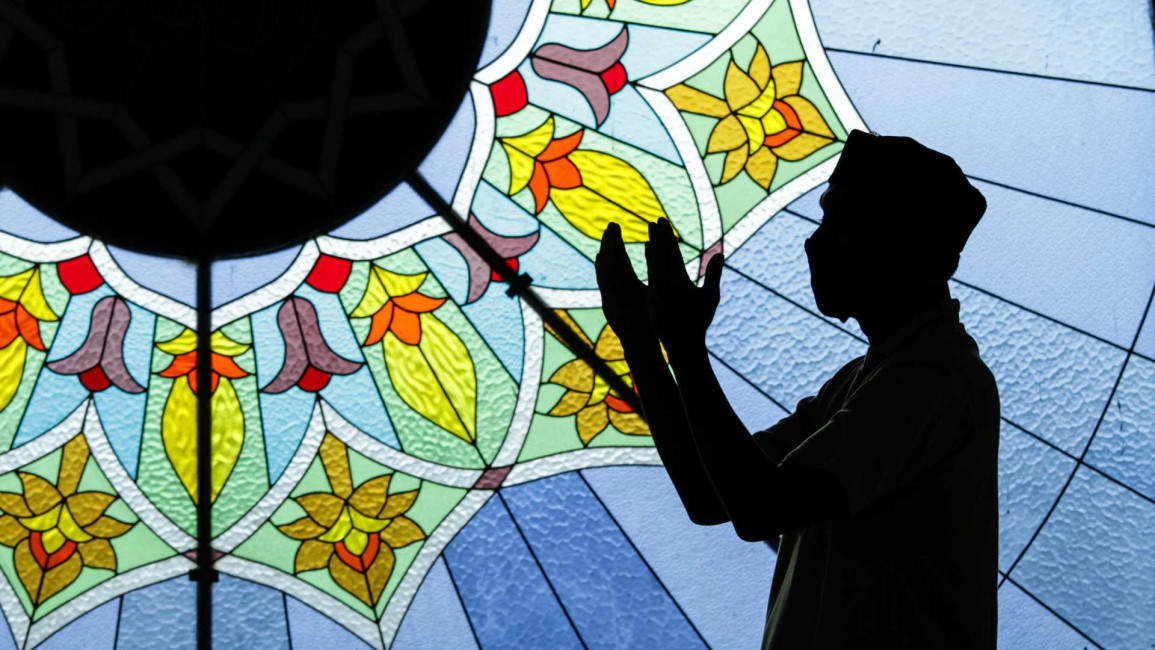In pictures: Muslims celebrate Eid amid curfews and fears over rising coronavirus cases
The three-day holiday is usually a time of travel, family get-togethers and lavish daytime feasts after weeks of dawn-to-dusk fasting. But this year many can only celebrate at home with immediate family, with coronavirus fears dampening the holiday spirit.
Many countries have tightened restrictions on movement for Eid al-Fitr, one of the most important dates in the Islamic calendar, despite having eased curfews earlier this month.
Saudi Arabia, home to Islam's holiest sites, began a five-day, round-the-clock curfew from Saturday after infections more than quadrupled since the start of Ramadan to around 68,000 - the highest in the Gulf.
Traditional Eid prayers will be held at the two holy mosques in the cities of Mecca and Medina "without worshippers", authorities said on Saturday, citing a royal decree.
 |
| A small number of worshippers gather around the Kaaba in Meeca for Eid prayers [AFP/Getty] |
Mecca's Grand Mosque has been almost devoid of worshippers since March, with a stunning emptiness enveloping the sacred Kaaba - a large cube-shaped structure towards which Muslims around the world pray.
Islam's third holiest site, Jerusalem's Al-Aqsa mosque, is set to reopen to worshippers only after Eid.
Israeli police on Sunday said they broke up an "illegal demonstration" and arrested two people outside the Al-Aqsa mosque. An Associated Press reporter at the scene said worshippers had tried to enter the compound.
In Lebanon, the highest Sunni religious authority has announced the reopening of mosques only for Friday prayers. Worshippers, however, will be subject to temperature checks and sanitary controls before they enter.
 |
| Palestinian worshippers pray at the gates of Jerusalem's al-Aqsa mosque [Anadolu/Getty] |
'If children can't celebrate, there is no point'
Meanwhile, Muslims across Asia - from Indonesia to Pakistan, Malaysia and Afghanistan - thronged markets for pre-festival shopping, flouting coronavirus guidelines and sometimes even police attempts to disperse large crowds.
"For over two months my children were homebound," said Ishrat Jahan, a mother of four, at a bustling market in the Pakistani city of Rawalpindi.
"This feast is for the kids, and if they can't celebrate it with new garments, there is no point in us working so hard throughout the year."
For the first time, Pakistan is celebrating Eid countrywide on the same day, ending an annual controversy between rival committees over the moon sighting that signals the start of the holiday.
 |
| Worshippers perform Eid prayers in Muzaffarabad, Pakistani-administrated Kashmir [Anadolu/Getty] |
Pakistan has taken measures to control the spread of the coronavirus since mid-March, but Prime Minister Imran Khan bowed to religious pressure and refused to close mosques during Ramadan, despite pleas from doctors and a rising number of infections. Pakistan has reported more than 52,000 cases and more than 1,100 deaths.
More than 1,000 worshippers gathered and prayed shoulder-to-shoulder in a open field in Karachi on Sunday, with only a few of them wearing face-masks.
In Indonesia - the world's most populous Muslim nation - people are turning to smugglers and fake travel documents to get around bans on the annual end-of-Ramadan travel that could send infections soaring.
In deeply conservative Aceh, the only Indonesian province enforcing Sharia law, public Eid prayers can still be performed at mosques and fields, but without shaking hands and with shortened sermons.
 |
| Muslims perform Eid prayers in Indonesia's Aceh province [SOPA Images/LightRocket/Getty] |
Regional epicentre strives to avoid new peak
The country has reported nearly 22,000 infections and 1,350 fatalities, the most in Southeast Asia.
The Covid-19 death tolls across the Middle East and Asia have been lower compared with Europe and the United States, but numbers are rising steadily, sparking fears the virus may overwhelm often underfunded healthcare systems.
Iran, which has experienced the Middle East's deadliest outbreak, has called on its citizens to avoid travel during Eid as it battles to control infection rates.
Iran shut schools and places of worship and banned inter-city travel for the Persian New Year holidays in March, but the restrictions were recently eased.
Health Minister Saeed Namaki said that the country was focusing hard on avoiding "new peaks of the disease" caused by people "not respecting health regulations".
 |
| Worshippers perform Eid prayers in the besieged Gaza Strip [Anadolu/Getty] |
The exact date of Eid has yet to be set in the Shia-majority country, but will likely be Monday, in line with the Shia community's celebrations in Iraq, as announced by top cleric Grand Ayatollah Ali Sistani.
Promising some respite from virus fears, 40 Muslim comedians from across the world will host a virtual show on Sunday called "The Socially Distant Eid Comedy Night".
"This Ramadan has been particularly difficult for communities around the world," said Muddassar Ahmed, head of the Concordia Forum, the organiser of the event.
"We're proud to be pulling together some of the brightest Muslim comedic talent to entertain those celebrating the Eid festival at home, people looking to learn a little bit about Muslim culture, or really anyone in need of a good laugh."
Follow us on Facebook, Twitter and Instagram to stay connected


![President Pezeshkian has denounced Israel's attacks on Lebanon [Getty]](/sites/default/files/styles/image_684x385/public/2173482924.jpeg?h=a5f2f23a&itok=q3evVtko)



 Follow the Middle East's top stories in English at The New Arab on Google News
Follow the Middle East's top stories in English at The New Arab on Google News


